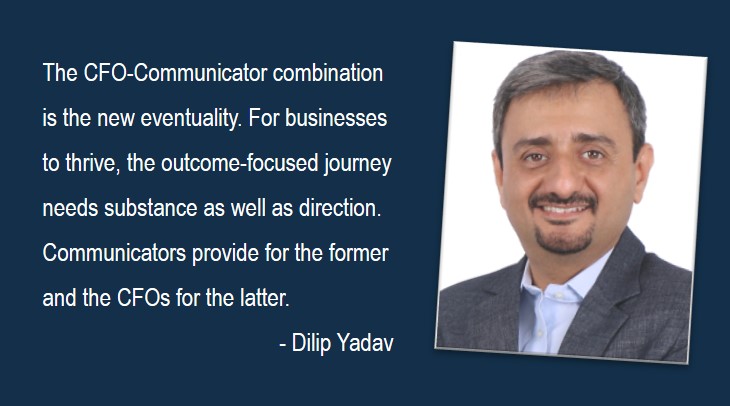In my career spanning more than two decades I have found CFO’s involvement with the communication function peaking the most either when there is a need to raise funds or if there is a dire situation such as a current or a looming crisis. Both are extraordinary situations revolving around shareholder value – one seeking value to be returned and the second preventing value from being destroyed. As modern organisations mature and traverse their advanced life-cycle stages, both the type and the extent of complexities they deal with increase manifold. The value creation question takes a new form. Value creation here is incremental and dispersed across many dimensions of the organisational ecosystem. There is pressure on business leaders to seek out yet newer ways of unlocking the next level of value for the organisation.
Here, communication, if dealt with creatively and effectively, can prove to be a differentiator between enduring value creation and temporary, short-term profit spikes. There is enough evidence to establish that just like it is in during the two extraordinary situations of fund raising or crisis, communication is the shining new instrument in a CFO’s arsenal to engineer incremental, every-day value addition. Today, an organisation’s success is determined by the value it can deliver to multiple stakeholders – from customers to employees, partners, regulators to the society at large. The need to measure and report this value accumulation is today a business success imperative.
For this, it is essential that we examine both, communications and business metrics through a new lens.
A new code for communicators
Communicators need to realise that CFO’s can be the best source of ceaseless capitalisation of their programmes, if the cause and effect relationship between communication and business outcomes is to be empirically reinforced.
Communicators are, at their core and key, trained to rally stakeholders. This is one supreme objective that communicators fulfil amidst the most fluid and stormiest of environments, with the astute use of the best and most appropriate communication strategies. This is very important from the finance leadership point of view because, today, businesses are increasingly seen as the sum total of their stakeholder aspirations and contributions, and therefore each stakeholder constituency must buy in to the overall business success journey. Thus, when an organisation moves ahead with an all-round liking and is buttressed with the support from its stakeholders who are key to its success, the journey becomes smooth, meaningful, and financially rewarding.
The CFO-Communicator mantra
The point of commencement for the CFO-Communicator duality to work out is, well, collaborative partnership. Both federating parties, as it were, should review their traditional approaches through a unifying narrative of business success using communication as the tool. This will help meet the singular organisation agenda: positive value outcomes. Today, it is really a no-brainer that great business outcomes are just impossible without communication. And, since CFOs are hugely and intrinsically concerned with this outcome aspect, communicators need to increasingly engage with this constituency. No question about that. Let us see how to best get this done:
Step 1: The first step is to have clarity and focus on what it is which constitutes the primary, highest-priority, business goal. The CFOs are best placed to decide this as they can sift rhetoric from reality. For them, any business success is what can be measured in clear, succinctly quantifiable terms, without any ambiguity. Communicators on the other hand, need to re-skill themselves to get under the skin of real business dynamics and speak the language of business metrics more frequently. The call for them is to be ends-focused or outcome-obsessed, and eschew the means justify the ends approach.
Step 2: Next, it is important to deep dive for relevant business insights to unearth linkages and causality between germane business success and communication for that specific domain. It is instructive to keep in mind that not all aspects of business are communication amenable and that not all communication can impact business metrics. It is this blind spot that the CFO-Communicator engagement needs to identify, isolate, and filter out. This is where CFOs and Communicators need to work together to find a common ground of insights.
Step 3: Once insights and strategies have been agreed too, budgets must be cogently allocated to smoothen and regulate the tempo of communication. Since finance directors live by RoIs, a communication RoI is something just up their alley. In the case of communication, which will need investment and the outlays thereof, right budgeting is key. Using media vehicles involves cost – transactional or earned over a period of time. Certain programmes require long term investments, such as those involving risk mitigation. CFOs will appreciate that such investments can save cost outages and contain reputational damage when a crisis actually hits.
Step 4: Operationalisation of the communication’s programme is the final stage. Here, communicators are in the driver’s seat while the CFOs can play the role of the astute navigators. A CFO, by carefully observing mission critical KPIs, can help measure, analyse, and report performance to understand whether the efforts are helping. This can also be helpful in presenting reports to the board.
There is nothing more financially rewarding than a good reputation. This has a direct impact on business’ success. A good reputation helps in better credit terms with vendors, it aids in faster regulatory clearances and a allows greater say from an organisation in the shaping of a favourable policy. Not only this, employees are ready to work longer term for the pride of belonging to a great workplace.
The CFO-Communicator combination is the new eventuality. In fact, communicators are as much custodians of reputation, as CFOs are its stewards. Both have a collective responsibility to the organisation: keeping it relevant. For businesses to thrive, the outcome-focused journey needs substance as well as direction. It is a good thing that communicators are there for the former and the CFOs for the latter. They are the yin and yang of the business success.
For more conversations around Innovation (if you are an in-house communications professional), attend the Innovation First Communication Conclave in Gurgaon on Thursday, March 7th, 2019.
The views expressed here are that of the author and do not necessarily reflect that of Reputation Today.



Leave a comment